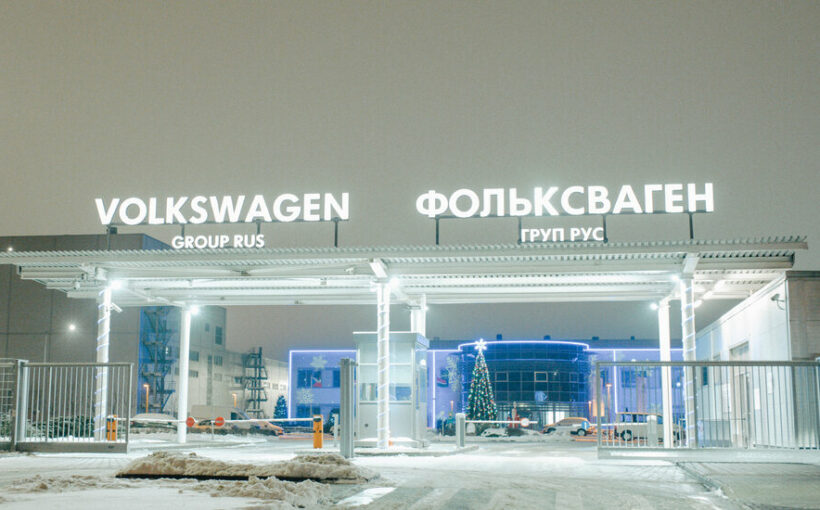Volkswagen has sold its assembly plant and other operations in Russia to a local auto dealership, more than a year after the German carmaker ceased production in the country following the invasion of Ukraine, the company said on Friday.
Under the deal, which required approval from the Russian government, a Moscow-based dealership called Avilon acquired the assets of Volkswagen Group Rus, the carmaker said. Neither company specified a sales price, but Russia media citing local records said Avilon paid about 125 million euros ($135 million).
Volkswagen made the announcement in a terse statement, but
declined to comment further on the deal.
The move makes Volkswagen the latest European carmaker to withdraw from Russia in the past year, joining several hundred other multinational corporations leaving a market where many spent decades currying and constructing. But outrage over Moscow’s brutal war in Ukraine, combined with the difficulties coping with tough economic sanctions aimed at punishing Russia, have made the Russian market less attractive.
Mercedes-Benz announced last month that it had sold its Russia division, including an assembly plant, to Avtodom, a Russian investor, roughly a year after it had suspended local manufacturing and the export of passenger cars and vans to Russia. The sale included a limited repurchase option, the company said, but did not give any further details.
Last year, the French automaker Renault negotiated a deal with the Russian government to sell its 68 percent stake in AvtoVAZ, Russia’s biggest carmaker, to a Moscow-based automotive research institute known as NAMI for the price of 1 ruble, with the option of resuming business in the country at a future date.
Volkswagen declined to say whether the sale included a clause to return to Russia. In addition to its plant, in Kaluga, a city in western Russia, the Volkswagen sale included the company’s components and leasing divisions.
Avilon, based in Moscow, did not comment on the sale and it was not immediately clear what its plans were for the Kaluga plant.
Before the full-scale invasion of Ukraine, Avilon sold Volkswagen vehicles as well dozens of other Western brands, including Mercedes-Benz, Jeep and Rolls-Royce. Since last year, it has also begun selling leading Chinese brands, such as Chery, Great Wall and Zeekr.
Volkswagen spent €774 million building the Kaluga plant, which opened in 2007. Two years later, President Vladimir V. Putin of Russia flew in by helicopter to celebrate the launch of full production of several of the company’s best-selling models, as well as models from its Skoda line.
The plant had capacity to turn out 225,000 vehicles a year, nearly the number of vehicles the company delivered to customers in Russia in 2021. Shortly after the invasion in February 2022, Volkswagen ceased operations at the plant. It also quit making cars at another plant, in Nizhny Novgorod, that was owned by Russian company Gaz Group but had been used by the German carmaker.
Gaz Group sued Volkswagen over the halt, seeking to freeze the German company’s assets in Russia. Last month, a court ruled in Volkswagen’s favor.
Over the past year, the Kaluga plant’s 4,000 employees remained on the payroll as they waited for information over whether they would be allowed to return to work. The idle plant was a financial drain on Volkswagen, which is scrambling to expand its electric vehicle offerings and revamp its core brand. It is also struggling to remain competitive in China, the world’s largest auto market, where the German company is losing ground to local brands.
Observers believe that large companies waited for several months to gauge the situation before making their decision whether to pull out. Large, multinational companies that had spent several decades building supply chains and networks realized that the complexity and reach of those systems made it difficult to bring them to a swift halt, said Sebastian Hoppe, a political economist at Berlin’s Free University who researches Russia.
”The more suppliers you have in Russia itself, the harder it is to pull out and the longer this whole process takes,” Mr. Hoppe said.
Carmakers in Russia employed 300,000 people in 2021 according to the country’s statistics agency, and up to 3.5 million more are estimated to work in related industries. Those jobs have been devastated over the past year, as auto production has dropped 77 percent in large part because Western firms have decided to pull up stakes and leave.
Other multinational firms are also deciding to turn their back on Russia. Henkel, a German maker of washing powder and other household products and Ikea, the Swedish furniture company, both sold their factories to local buyers in Russia earlier this year.
The sale of factories and other assets may have come at a loss, but many Western companies do not expect Russia’s economy to return to normal growth in the near future.
“What I think is also important, it is of course the case that the Russian market tends to be less attractive than it was before the war,” Mr. Hoppe said.
Source: Read Full Article
